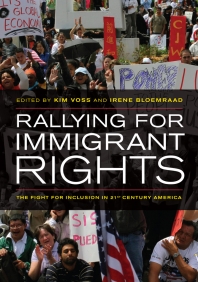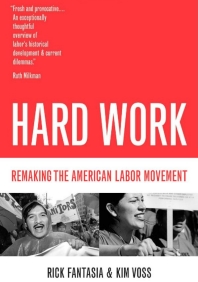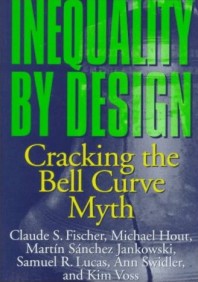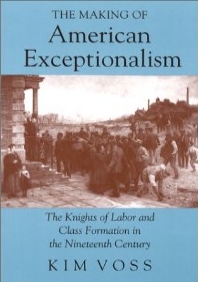
Kim Voss
Kim Voss arrived at Berkeley in 1986 with a Ph.D. from Stanford. She studies social movements, labor, inequality, higher education, and comparative-historical sociology.
Her current research examines immigrants and social movements in historical and comparative perspective, analyzes dilemmas facing the U.S. labor movement, and investigates the shifting terrain of U.S. higher education. In addition to publishing in academic journals in sociology, political science, and demography, she has written or edited six books: Rallying for Immigrant Rights (2011, with I. Bloemraad), Hard Work: Remaking the American Labour Movement (2006, with R. Fantasia), Rebuilding Labor: Organizing and Organizers in the New Union Movement (2004, with R. Milkman), Des Synidcats Domestiques: Repression Patronale et Resistance Syndicale Aux Etas-Unis (2003, with R. Fantasia), Inequality by Design: Cracking the Bell Curve Myth (1996, with five Berkeley colleagues), and The Making of American Exceptionalism: The Knights of Labor and Class Formation in the Nineteenth Century (1993).
Her most recent publications include two 2024 articles, one in Socius: “Inactive and Quiescent? Immigrant Collective Action in Comparative Perspective, 1960-1995” (with S. Lauterwasser and I. Bloemraad), and one in Social Problems: "Persistent Inequalities in College Completion, 1980-2010" (with Michael Hout and Kristin George).
Books
 2011 Rallying for Immigrant Rights:The Fight for Inclusion in 21st Century America. With Irene Bloemraad (eds), Berkeley: University of California Press.
2011 Rallying for Immigrant Rights:The Fight for Inclusion in 21st Century America. With Irene Bloemraad (eds), Berkeley: University of California Press. 2004 Hard Work: Remaking the American Labor Movement. With Rick Fantasia. Berkeley: University of California Press.
2004 Hard Work: Remaking the American Labor Movement. With Rick Fantasia. Berkeley: University of California Press. 2004 Rebuilding Labor: Organizing and Organizers in the New Union Movement. Edited volume, with Ruth Milkman, Cornell University Press.
2004 Rebuilding Labor: Organizing and Organizers in the New Union Movement. Edited volume, with Ruth Milkman, Cornell University Press.- 2003 Des Synidcats Domestiques: Repression Patronale et Resistance Syndicale Aux Etas-Unis, With Rick Fantasia. Paris: Editions Raisons D’Agir.
 1996 Inequality by Design: Cracking the Bell Curve Myth. With Claude Fischer, Michael Hout, Martin Sanchez Jankowski, Sam Lucas, and Ann Swidler. Princeton University Press.
1996 Inequality by Design: Cracking the Bell Curve Myth. With Claude Fischer, Michael Hout, Martin Sanchez Jankowski, Sam Lucas, and Ann Swidler. Princeton University Press. 1993 The Making of American Exceptionalism: The Knights of Labor and Class Formation in the Nineteenth Century. Cornell University Press.
1993 The Making of American Exceptionalism: The Knights of Labor and Class Formation in the Nineteenth Century. Cornell University Press.
Selected Articles and Chapters
- 2024. "Inactive and Quiescent? Immigrant Collective Action in Comparative Perspective, 1960-1995.” with Steven Lauterwasser and Irene Bloemraad. Socius.
- 2024. "Persistent Inequalities in College Completion, 1980-2010." with Michael Hout and Kristin George. Social Problems 72 (2), pp. 480-508.
- 2020. “Movement or Moment? Lessons from the pro-immigrant movement in the United States and contemporary challenges,” with Irene Bloemraad. Journal of Ethnic and Migration Studies, 46 (4): 683-704.
- 2020. “The Limits of Rights: Claims-making on Behalf of Immigrants,” with Fabiana Silva and Irene Bloemraad. Journal of Ethnic and Migration Studies, 46 (4): 791-819.
- 2020. “Been Down So Long, It Looks Like Up to Me: Shifting Targets, Changing Repertoires, and Internal Democracy in the U.S. Labor Movement,”with Pablo Gaston. In James Jasper and Braydon King, Protesters and Their Targets, Temple University Press.
- 2016. "Rights, Economics, or Family? Frame Resonance, Political Ideology, and the Immigrant Rights Movement," with Irene Bloemraad and Fabiana Silva, Social Forces
- 2015. “Same as it Ever Was? New Labor, the CIO Organizing Model, and the Future of American Unions,” Politics and Society,43: 453-457.
- 2012. "The Local in the Global: Rethinking Social Movements in the New Millennium," with Michelle Williams, Democratization, Vol. 19 (2), pp. 352-377.
- 2011. "The Immigration Rallies of 2006: What Were They, How Do We Understand Them, Where Do We Go?” with Irene Bloemraad and Taeku Lee. In Voss and Bloemraad, Rallying for Immigrant Rights, University of California Press.
- 2010. "Enduring Legacy? Charles Tilly and Durable Inequality,” American Sociologist 41 (November): 368-37.
- 2010. "Democratic Dilemmas: Union Democracy and Union Renewal,” Transfer: European Review of Labor and Research, 16 (August): 369-382.
- 2000 “Breaking the Iron Law of Oligarchy: Tactical Innovation and the Revitalization of the American Labor Movement,” With Rachel Sherman. American Journal of Sociology, 106 (September): 303-349.